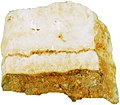| Brown spar | |
|---|---|
 Brown spar (siderite, Silesia) Brown spar (siderite, Silesia) | |
| General | |
| Category | Mineral |
Brown spar or brown-spar (German: braunspat) is a trivial, partly obsolete name for at least four carbonate minerals that are relatively similar in composition: ankerite, dolomite (with varieties), magnesite (with varieties) and siderite, which have a characteristic dirty-brown hue due to the content of iron compounds, as well as an admixture of manganese oxide. As a consequence, many varieties of dolomite, colored brown or grey-brown by impurities, are also known as brown spar.
The name brown spar is both capacious and vividly descriptive, referring exclusively to the appearance of the stones; short and convenient for everyday conversational use, it was approximately equally characteristic of both English-language and German mineralogy until the end of the 19th century. However, even later this stable phrase remained in the speech of miners, geologists and other craft specialties — as a colloquial term of broad or not entirely definite meaning, applicable to three or even four different minerals.
Main minerals and varieties
- Ankerite is a mineral, a complex carbonate from the dolomite group, in which some of the magnesium ions are replaced by iron, calculated formula Ca(Fe,Mg,Mn)(CO3)2. The chemical composition is sometimes complicated by impurities of manganese and cobalt. The ferrous member of the dolomite-ankerite isomorphic series, structurally close to dolomite.
- Dolomite or bitter spar is a mineral common in the earth's crust from the class of carbonates with the chemical composition CaCO3•MgCO3, varieties close to dolomite from the same isomorphic series, colored brown or dirty brown by iron and manganese impurities (ferriferous dolomite) can also be found under the name brown spar.
- Siderite is a hydrothermal or sedimentary mineral, in composition iron carbonate with the ideal formula FeCO3, depending on the amount and nature of impurities, has a color from white or yellowish-white to reddish-brown. Dirty-colored differences of brown shades are known as brown spar.
- Magnesite (ferrous) or breunnerite is a mineral common in the earth's crust from the class of carbonates with the chemical composition MgCO3. Among the most common impurities found in magnesite are the same iron ions (Fe) or manganese, which give the white or translucent mineral a cloudy red or brown color. In such cases, it can also be called brown spar.
- Mesitine spar (mesitite), or breunnerite — a carbonate of iron and manganese, occurring in yellowish rhombohedrons. This includes much of what is called rhomb spar (rhombic spar), or brown spar, which becomes rusty on exposure.
- Mesitine spar (pistomesite), — another brown variety of the magnesite → siderite isomorphic series, formerly known as mesitite or brown spar and containing a greater amount of iron carbonate than mesitite and breunnerite.
Brown spar gallery
See also
References
- ^ Krivovichev V. G. Mineralogical glossary. Scientific editor A. G. Bulakh. — St.Petersburg: St.Petersburg Univ. Publ. House. 2009. — 556 p. — ISBN 978-5-288-04863-0
- ^ Bulletin of the United States National Museum. No.30. Publiched under the Directions of the Smitsonian Institution. — Washington: Government Printing Office, 1885.
- ^ Georgy Shcherbina. Mountain English-Russian Dictionary. — Moscow, Vologda: Infra-Engineering, 2022. — 784 p.
- ^ 礦物學名詞: (俄英中对照試用本) Mineralogical Terminology (Russian-English-Chinese version). — Beijing: 中國科学院. 編譯出版委員会 Compilation and Publication Committee of Chinese Academy of Sciences, 1956. — 279 p.
- Lodotshnikov V. N. The main rock-forming minerals. — Moscow: Nedra, 1974. — 248 p.
- Brush, George Jarvis (1875). Manual of Determinative Mineralogy: with an introduction on blow-pipe analysis. — New York : John Wiley & Son, 1875.
- Dana, James Dwight (1853). Manual of Mineralogy: Including Observations on Mines, Rocks, Reduction of Ores and the Application of the Science to the Arts. — Durrie and Peck (5th edition), 1853.
- Justus Freiherr von Liebig. Annual Report of the Progress of Chemistry, and the Allied Sciences, Physics, Mineralogy, and Geology. — Taylor, Walton, and Maberly, 1850. — 646 p.
If an internal link incorrectly led you here, you may wish to change the link to point directly to the intended article. Categories:





